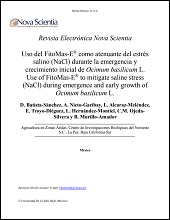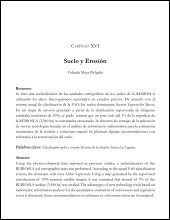| dc.creator | DAULEMYS BATISTA SANCHEZ | |
| dc.creator | ALEJANDRA NIETO GARIBAY | |
| dc.creator | LILIA ALCARAZ MELENDEZ | |
| dc.creator | ENRIQUE TROYO DIEGUEZ | |
| dc.creator | LUIS GUILLERMO HERNANDEZ MONTIEL | |
| dc.creator | CARLOS MICHEL OJEDA SILVERA | |
| dc.creator | BERNARDO MURILLO AMADOR | |
| dc.date | 2015-12 | |
| dc.identifier | http://cibnor.repositorioinstitucional.mx/jspui/handle/1001/608 | |
| dc.identifier.uri | http://dspace.cibnor.mx:8080/handle/123456789/650 | |
| dc.description | "El uso de bioestimulantes vegetales estimula la emergencia y el crecimiento vegetal debido a que
están compuestos por sustancias naturales como carbohidratos, péptidos de bajo peso molecular y
aminoácidos, activadores de las funciones fisiológicas de las plantas, por lo que su aplicación
permite un mejor aprovechamiento de los nutrientes y representa una opción para enfrentar
problemas de estrés abiótico por salinidad. El objetivo de este estudio fue determinar el efecto del
bioestimulante FitoMas-E® derivado de la caña de azúcar como atenuante de la salinidad en la
emergencia y el crecimiento de plántulas de variedades de albahaca (Ocimum basilicum L.) con
respuesta diferencial al estrés por salinidad. Tres variedades de albahaca: Napoletano, Emily y
Nufar se sometieron a cuatro concentraciones de NaCl (0, 50, 100 y 150 mM) y cuatro dosis de
FitoMas-E® (0, 0.5, 1.0 y 1.5 mL L-1
) en un diseño completamente al azar con arreglo factorial
con cuatro repeticiones. El trabajo se desarrolló en una estructura de malla sombra y las variables
que se midieron fueron: porcentaje y tasa de emergencia, longitud de radícula, altura de la
plántula, biomasa fresca y seca de radícula y de parte aérea. Los resultados evidenciaron que en
condiciones de estrés salino (NaCl) de moderado a severo, las variables disminuyeron
significativamente. Largo de raíz, altura de planta y biomasa seca de raíz en 150 mM de NaCl
fueron las más afectadas. Se observó que cuando se aplicó FitoMas-E® las plantas incrementaron
significativamente sus valores en las variables, largo de raíz 32% y altura de planta 41%, lo que
revela el efecto estimulante del FitoMas-E®, siendo 0.5 mL L-1 la dosis estimulante para la
variedad Napoletano y 1.0 mL L-1 para la variedad Emily, aún y cuando se encontraban en
condiciones de estrés salino hasta 100 mM de NaCl. Para la concentración de 150 mM se
evidenció una afectación extrema para las variedades Emily y Nufar. " | |
| dc.description | "The use of bioestimulants for vegetables may stimulate emergence and plant growth since they
are composed of natural substances such as carbohydrates, peptides of low molecular weight and
amino-acids, activators of the physiological functions of plants, thus its application allows for a
better use of nutrients and represents an option to deal with problems of abiotic stress by salinity.
The objective of this study was to determine the effect of the bioestimulant FitoMas-E® derived
from sugarcane as to mitigate salinity stress in the emergence and growth of seedlings of varieties
of basil (Ocimum basilicum L.). Three varieties of basil Napoletano, Emily and Nufar underwent
four concentrations of NaCl (0, 50, 100 and 150 mM) and four doses of FitoMas-E® (0, 0.5, 1.0
and 1.5 mL L-1
) in a completely randomized arrangement design with four replicates. The work
was carried-out in semicontrolled conditions in a mesh-shade structure and the variables that
were measured were: percentage and rate of emergence, radicle length, seedling height, fresh and
dry biomass of radicle and shoot. The results showed that when subjected to salt stress (NaCl) of
moderate to severe, the variables decreased significantly, the most affected being the length of
the root, the plant height and dry biomass of root at 150 mM NaCl. It was observed that when
FitoMas-E® applied, values of plant variables increased significantly, length of root by 32% and
plant height by 41%, which reveals the stimulatory effect of the FitoMas-E®, where 0.5 mL L-1
the stimulant dose for the variety Napoletano and 1.0 mL L-1 for variety Emily, under saline stress
conditions up to 100 mM of NaCl. For 150 mM concentration, the Emily and Nufa plant varieties
were extremely affected." | |
| dc.format | application/pdf | |
| dc.language | spa | |
| dc.publisher | Universidad De La Salle Bajío (México) | |
| dc.relation | info:eu-repo/semantics/dataset/URL/URL: http://novascientia.delasalle.edu.mx/ojs/index.php/Nova | |
| dc.relation | info:eu-repo/semantics/reference/ISSN/2007 - 0705 | |
| dc.rights | info:eu-repo/semantics/openAccess | |
| dc.rights | http://creativecommons.org/licenses/by-nc-nd/4.0 | |
| dc.source | Nova Scientia | |
| dc.subject | info:eu-repo/classification/AUTOR/FitoMas-E®, NaCl, porcentaje de emergencia, albahaca | |
| dc.subject | info:eu-repo/classification/AUTOR/FitoMas-E®, NaCl, emergence percentage, basil | |
| dc.subject | info:eu-repo/classification/cti/2 | |
| dc.subject | info:eu-repo/classification/cti/24 | |
| dc.subject | info:eu-repo/classification/cti/2417 | |
| dc.subject | info:eu-repo/classification/cti/241713 | |
| dc.title | Uso del FitoMas-E® como atenuante del estrés salino (NaCl) durante la emergencia y crecimiento inicial de Ocimum basilicum L. Use of FitoMas-E® to mitigate saline stress (NaCl) during emergence and early growth of Ocimum basilicum L. | |
| dc.type | info:eu-repo/semantics/article | |
| dc.type | info:eu-repo/semantics/publishedVersion | |


